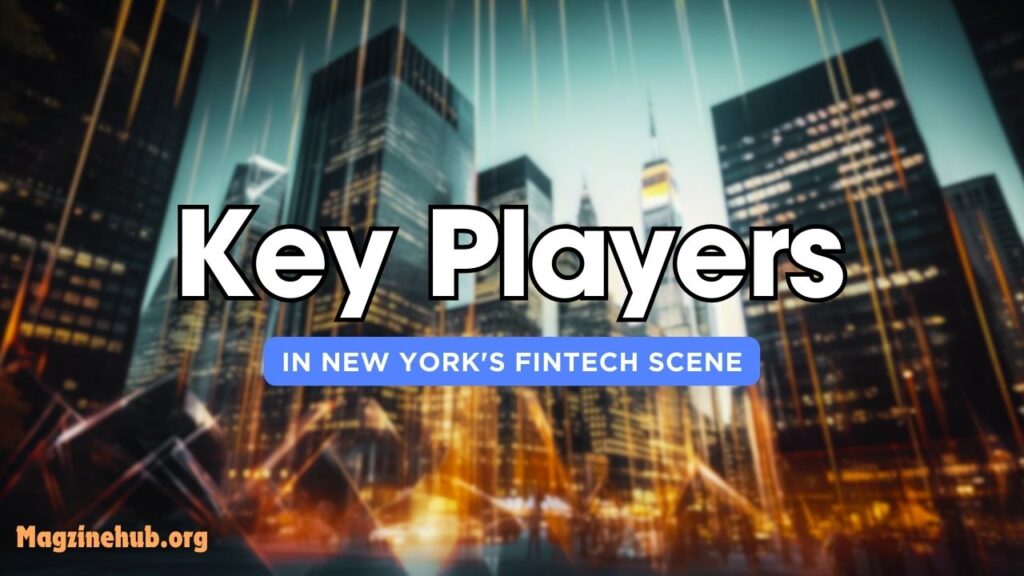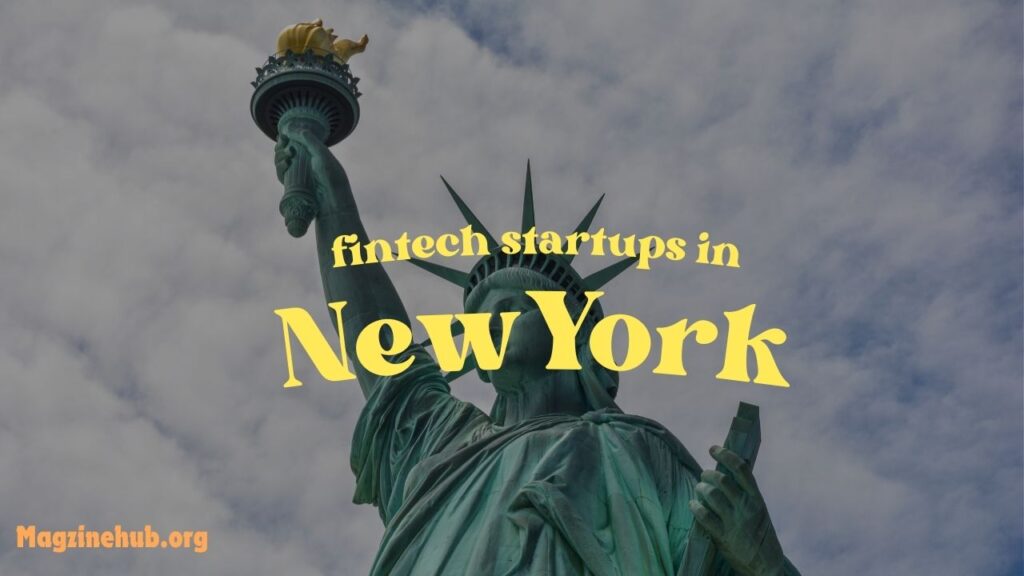Discover the dynamic world of FinTech startups in New York. Learn about key players, cutting-edge innovations, regulatory challenges, and the impact of California’s FinTech startups invading New York’s thriving ecosystem. Explore the future of finance today!
Table of Contents
Introduction
New York City, often hailed as the financial capital of the world, has witnessed a seismic shift in its financial landscape with the rise of FinTech startups. These innovative companies are transforming the way financial services are delivered, making them more accessible, efficient, and user-friendly. This blog delves into the vibrant ecosystem of FinTech startups in New York, exploring key players, trends, regulatory challenges, and the influence of California’s FinTech startups invading New York.
The Rise of FinTech in New York
New York’s strategic position as a global financial hub has made it a fertile ground for FinTech innovation. The city’s robust financial infrastructure, access to top-tier talent, and a diverse pool of investors create an ideal environment for startups to thrive. Over the past decade, New York FinTech startups have grown exponentially, offering solutions that range from payment processing and wealth management to blockchain technology and artificial intelligence.
Key Players in New York’s FinTech Scene

Payment Processors
Payment processing is a critical component of the FinTech ecosystem. Companies like Stripe and Square have established themselves as leaders in this space. Stripe, originally from California, has a significant presence in New York and offers a comprehensive suite of payment solutions for businesses of all sizes. Square, co-founded by Jack Dorsey, provides innovative point-of-sale systems that streamline transactions for retailers and service providers.
Blockchain and Cryptocurrencies
New York is home to pioneering blockchain startups such as Chainalysis and Gemini. Chainalysis specializes in blockchain analysis and provides crucial insights for compliance and fraud prevention. Gemini, founded by the Winklevoss twins, is a regulated cryptocurrency exchange that emphasizes security and transparency, contributing to the mainstream adoption of digital currencies.
Wealth Management and Robo-Advisors
FinTech startups like Betterment and Wealthfront are revolutionizing wealth management. Betterment, headquartered in New York, offers automated investment advice and portfolio management, making sophisticated financial planning accessible to the masses. Wealthfront, though based in California, has a strong influence on New York’s FinTech scene, providing AI-driven investment strategies that cater to individual needs.
Innovation and Disruption
FinTech startups in New York are not merely enhancing existing financial services; they are disrupting traditional models. By leveraging cutting-edge technologies such as artificial intelligence, machine learning, and big data, these startups are creating smarter, more efficient financial products and services. This disruption is fostering a more inclusive financial system, providing opportunities for underserved populations.
Artificial Intelligence and Machine Learning
AI and machine learning are at the forefront of FinTech innovation. Companies like Kasisto are using AI to develop intelligent banking assistants that enhance customer engagement and streamline banking operations. Machine learning algorithms are also being employed for fraud detection, credit scoring, and personalized financial advice.
Big Data Analytics
Big data analytics is transforming the way financial institutions operate. Startups like Enigma in New York are harnessing the power of big data to provide actionable insights that drive business decisions. By analyzing vast amounts of data, these companies can identify trends, predict market movements, and optimize financial strategies.
Peer-to-Peer Lending
Peer-to-peer lending platforms such as LendingClub have disrupted traditional banking by connecting borrowers directly with lenders. This model reduces the need for intermediaries, lowers costs, and offers competitive interest rates. LendingClub’s success has spurred the growth of similar platforms in New York, expanding access to credit for individuals and small businesses.
The Role of Regulations

Navigating the complex regulatory landscape is a significant challenge for FinTech startups. However, New York’s regulatory framework, including the New York State Department of Financial Services (NYDFS), offers a clear path for compliance, helping startups to innovate within legal boundaries. Initiatives like the FinTech Innovation Lab also provide support and mentorship, helping startups to scale and succeed.
NYDFS and Compliance
The NYDFS plays a crucial role in regulating FinTech activities in New York. It ensures that startups adhere to stringent standards of security, transparency, and consumer protection. The BitLicense, introduced by NYDFS, sets out specific requirements for cryptocurrency businesses, fostering a secure and compliant environment for digital assets.
FinTech Innovation Lab
The FinTech Innovation Lab, founded by the Partnership Fund for New York City and Accenture, is a highly competitive accelerator program that supports early and growth-stage FinTech companies. The program provides startups with access to top financial institutions, mentorship from industry leaders, and opportunities to refine their business models.
Investment and Growth
Investment in New York’s FinTech sector has been robust, with venture capital firms and angel investors keen to back innovative ideas. This influx of capital has fueled the growth of numerous startups, allowing them to scale rapidly and bring new products to market. The city’s vibrant startup ecosystem, including incubators and accelerators like Techstars and Y Combinator, further supports this growth.
Venture Capital and Angel Investors
Venture capital firms such as Andreessen Horowitz, Sequoia Capital, and Union Square Ventures have been instrumental in funding New York FinTech startups. These investors provide not only financial backing but also strategic guidance and industry connections. Angel investors, including successful entrepreneurs and industry veterans, also play a vital role in nurturing early-stage startups.
Incubators and Accelerators
New York boasts a range of incubators and accelerators that support FinTech startups. Techstars, one of the most prominent accelerators, offers a rigorous program that helps startups refine their business models, scale their operations, and connect with potential investors. Y Combinator, although based in California, has a significant influence on the New York startup scene, attracting high-potential startups from around the world.
California’s FinTech Startups Invading New York

The influence of California’s FinTech startups is palpable in New York. Companies from Silicon Valley, known for their technological prowess and innovative approaches, are expanding their presence in New York, bringing fresh ideas and competition to the local market.
Expansion and Collaboration
California-based FinTech giants like Plaid and Robinhood have established offices in New York, seeking to tap into the city’s vast financial resources and diverse talent pool. Plaid, known for its financial data APIs, collaborates with New York banks and startups to integrate financial services seamlessly. Robinhood, the commission-free trading platform, has attracted a significant user base in New York, promoting financial inclusion and democratizing access to investments.
Competitive Landscape
The entry of California’s FinTech startups into New York has intensified competition, pushing local startups to innovate and differentiate themselves. This healthy competition fosters a dynamic ecosystem where startups continuously strive to improve their offerings and meet the evolving needs of consumers.
Future Trends
The future of FinTech in New York looks promising, with trends such as open banking, decentralized finance (DeFi), and financial inclusion gaining traction. Open banking initiatives are encouraging collaboration between traditional banks and FinTech startups, while DeFi is creating new opportunities for decentralized financial services. Additionally, efforts to enhance financial inclusion are ensuring that more people have access to essential financial services.
Open Banking
Open banking is revolutionizing the financial landscape by promoting transparency and collaboration. By allowing third-party developers to build applications and services around financial institutions, open banking is fostering innovation and enhancing customer experiences. New York FinTech startups are at the forefront of this movement, developing cutting-edge solutions that integrate seamlessly with traditional banking systems.
Decentralized Finance (DeFi)
DeFi is an emerging trend that leverages blockchain technology to create decentralized financial services. Startups in New York are exploring DeFi applications that offer decentralized lending, borrowing, and trading platforms. These solutions provide greater financial freedom and reduce reliance on centralized institutions, democratizing access to financial services.
Financial Inclusion
Enhancing financial inclusion remains a key focus for FinTech startups in New York. Companies are developing solutions that cater to underserved populations, providing access to banking, credit, and investment opportunities. Initiatives such as mobile banking apps, micro-lending platforms, and financial literacy programs are making significant strides in bridging the financial inclusion gap.
Conclusion
New York’s FinTech landscape is a dynamic and exciting space, characterized by innovation, disruption, and growth. As these startups continue to push the boundaries of what’s possible in finance, they are not only transforming the industry but also making financial services more accessible and efficient for everyone. The city’s unique blend of financial expertise, technological innovation, and entrepreneurial spirit makes it the perfect place for FinTech startups to thrive.
California’s FinTech startups invading New York further enrich the ecosystem, fostering collaboration and healthy competition. As the sector continues to evolve, New York will undoubtedly remain a global leader in FinTech innovation, shaping the future of finance for years to come.
FAQs
What is FinTech?
FinTech, or Financial Technology, refers to innovative technology that aims to improve and automate the delivery and use of financial services. It encompasses a wide range of applications including payment processing, wealth management, blockchain technology, and more.
Why is New York City a major hub for FinTech startups?
New York City is a major hub for FinTech startups due to its status as a global financial center. The city’s robust financial infrastructure, access to top-tier talent, diverse pool of investors, and strategic position contribute to a fertile ground for FinTech innovation and growth.
Who are some key players in New York’s FinTech scene?
Key players in New York’s FinTech scene include payment processors like Stripe and Square, blockchain startups such as Chainalysis and Gemini, and wealth management companies like Betterment and Wealthfront. These companies lead various sectors within the FinTech industry.
How are FinTech startups disrupting traditional financial services?
FinTech startups are disrupting traditional financial services by leveraging technologies such as artificial intelligence, machine learning, and big data analytics. They offer more efficient, accessible, and user-friendly financial products and services, which foster a more inclusive financial system.
What role does artificial intelligence (AI) play in FinTech innovation?
AI plays a crucial role in FinTech innovation by enhancing customer engagement, streamlining banking operations, detecting fraud, improving credit scoring, and providing personalized financial advice. Companies like Kasisto use AI to develop intelligent banking assistants that significantly improve customer service.
How is big data analytics transforming financial services?
Big data analytics transforms financial services by providing actionable insights that drive business decisions. Companies like Enigma analyze vast amounts of data to identify trends, predict market movements, and optimize financial strategies, thereby improving the efficiency and effectiveness of financial institutions.
What is peer-to-peer lending and how is it impacting traditional banking?
Peer-to-peer (P2P) lending connects borrowers directly with lenders, reducing the need for intermediaries like traditional banks. This model lowers costs and offers competitive interest rates. Platforms like LendingClub have expanded access to credit for individuals and small businesses, significantly impacting traditional banking practices.
How do regulations impact FinTech startups in New York?
Regulations significantly impact FinTech startups by ensuring they adhere to standards of security, transparency, and consumer protection. The New York State Department of Financial Services (NYDFS) provides a clear regulatory framework, including the BitLicense for cryptocurrency businesses, helping startups innovate within legal boundaries.
What support systems exist for FinTech startups in New York?
Support systems for FinTech startups in New York include programs like the FinTech Innovation Lab, incubators, and accelerators such as Techstars and Y Combinator. These programs offer mentorship, access to financial institutions, and opportunities to refine business models and scale operations.
How does investment drive the growth of FinTech startups in New York?
Investment from venture capital firms and angel investors drives the growth of FinTech startups by providing financial backing, strategic guidance, and industry connections. Firms like Andreessen Horowitz, Sequoia Capital, and Union Square Ventures have been instrumental in funding and nurturing New York FinTech startups.
What impact do California’s FinTech startups have on New York’s ecosystem?
California’s FinTech startups, known for their technological prowess and innovation, are expanding into New York, bringing fresh ideas and competition. Companies like Plaid and Robinhood have established a presence in New York, enhancing the local ecosystem through collaboration and competitive dynamics.
What future trends are shaping the FinTech industry in New York?
Future trends shaping the FinTech industry in New York include open banking, decentralized finance (DeFi), and financial inclusion. Open banking fosters innovation and collaboration, DeFi leverages blockchain for decentralized financial services, and initiatives aimed at financial inclusion are ensuring broader access to essential financial services.
How is open banking revolutionizing financial services?
Open banking revolutionizes financial services by promoting transparency and collaboration. It allows third-party developers to build applications and services around financial institutions, enhancing customer experiences and fostering innovation. New York FinTech startups are at the forefront of this movement.
What is decentralized finance (DeFi) and how is it changing the financial landscape?
Decentralized finance (DeFi) uses blockchain technology to create decentralized financial services such as lending, borrowing, and trading platforms. DeFi reduces reliance on centralized institutions, offering greater financial freedom and democratizing access to financial services. Startups in New York are actively exploring and developing DeFi applications.
How are FinTech startups enhancing financial inclusion?
FinTech startups enhance financial inclusion by developing solutions that cater to underserved populations. These include mobile banking apps, micro-lending platforms, and financial literacy programs, which provide access to banking, credit, and investment opportunities for more people.
What makes New York an ideal environment for FinTech startups to thrive?
New York’s unique blend of financial expertise, technological innovation, entrepreneurial spirit, and strategic position as a global financial center make it an ideal environment for FinTech startups to thrive. The city’s vibrant ecosystem supports innovation, growth, and the continuous evolution of financial services.
How do incubators and accelerators support FinTech startups in New York?
Incubators and accelerators like Techstars and Y Combinator provide FinTech startups with mentorship, resources, and networking opportunities. They help startups refine their business models, scale operations, and connect with potential investors, significantly contributing to their growth and success.
What role does the NYDFS play in regulating FinTech startups?
The New York State Department of Financial Services (NYDFS) plays a crucial role in regulating FinTech startups by ensuring compliance with standards of security, transparency, and consumer protection. NYDFS initiatives, such as the BitLicense for cryptocurrency businesses, create a secure and compliant environment for innovation.
How are FinTech startups using machine learning to improve financial services?
FinTech startups use machine learning to improve financial services by developing algorithms for fraud detection, credit scoring, and personalized financial advice. Machine learning enhances the efficiency and accuracy of financial operations, providing better outcomes for consumers and businesses.
Why is collaboration important for FinTech startups in New York?
Collaboration is important for FinTech startups in New York because it fosters innovation, helps navigate regulatory challenges, and provides access to resources and expertise. Collaborative efforts with traditional financial institutions, other startups, and regulators enhance the overall ecosystem and drive the growth of the FinTech sector.
